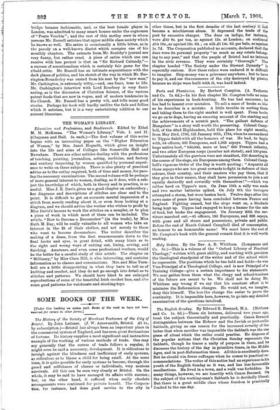SOME BOOKS OF THE WEEK.
[Under this heading we notice such Books of the week as have not been reserved for review in other forms.] The History of the Society of Merchant Venturers of the City of Bristol. By John Latimer. (J. W. Arrowsmith, Bristol. .21 is., by subscription.)—Bristol has always been an important place in the commercial system of England, and has seen great fluctuations of fortune. Its history supplies a most significant and instructive example of the working of various methods of trade. One may say generally that the course of trade follows a regular, it might even be said a necessary, development. It is ridiculous to inveigh against the blindness and inefficiency of early systems, as ridiculous as to blame a child for being small. At the same time, it is quite possible for early systems to become, through the greed and selfishness of classes or individuals, very noxious survivals. All this can be seen very clearly at Bristol. On the whole, it may be said to have managed its affairs with success ; but, on the other hand, it suffered when really obsolete arrangements were continued for private benefit. The Corpora- tion, for instance, had done good service to the city in other times, but in the first decades of the last century it iiad become a mischievous abuse. It depressed the trade of the port by excessive charges. The dues on indigo, for instance, were £10 8s. per ton, as against 12s. at London ; on cochineal .214 16s., as against 12s. 6d. ; on silk 21 14s. 6d. per bale, as against is. 7d. The Corporation published no accounts, declared that the dues were its personal property "as much as any estate belong. ing to any peer," and that the people of Bristol had no interest in the civic revenue. They were certainly "thorough." The chapter headed "The Society under the Stewart Dynasty" is especially curious. How these rulers were endured it is difficult to imagine. Ship-money was a grievance anywhere ; but to have to pay it, and see the commerce of the city destroyed by pirates because no ships were built with it, was hard indeed.










































 Previous page
Previous page